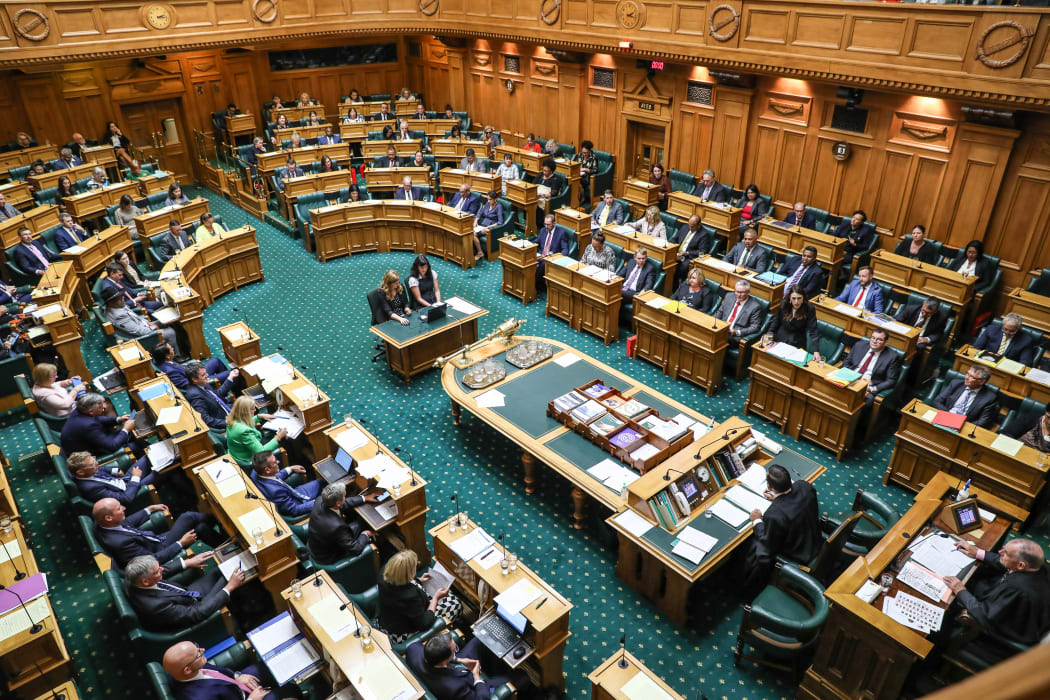This Thursday Parliament has an extra item on its agenda. Something new - a special debate. Specifically a debate on Aid to the Pacific.
‘Bah Humbug’, I hear you say ‘Parliament has dozens of debates every week’.
Yes it does, but until now it had no easy way of deciding to debate a topic without a specific outcome in mind. To just shooting the breeze to see where it might blow. Now it does.

New Zealand's Parliament has a strong relationship with its counterparts in the Pacific including regular visits in both directions. Here a kindergartener at Koroipita in Fiji munches on an apple. An expensive import, the fruit was a gift from the visiting New Zealand parliamentary delegation. Photo: VNP / Daniela Maoate-Cox
Round up the usual debates
There are various kinds of ‘normal’ debates at Parliament. Here are the major contenders:
- There are General Debates every Wednesday - but they are without any specific topic at all. They are a free-for-all so getting every party or MP to agree to a topic would be… unusual.
- There are many debates over proposed laws (bills) - but they are very tightly restricted to the specifics of the bill.
- There are occasionally debates responding to Ministerial Statements - but they are on an urgent matter of policy (on Lockdowns for example). They are initiated by the Government, not by Parliament.
- There are occasionally ‘urgent debates’, similar to Ministerial Statement debates but requested by the opposition. The topic has to be urgent and crucial though, so not a place for spitballing.
- There are debates around ‘motions’ - but they are not usually policy focused. They usually commemorate, thank, remember, celebrate etc. This week for example,there is one to mark the 10th anniversary of the Christchurch earthquake.
The new, special debate
This new category of debate is possible because the Standing Orders for this new Parliament have a new section included under the heading of ‘Business Committee’. (The Business Committee is a cross-party committee chaired by the Speaker that can decide on House business and operates on the basis of ‘near unanimity’.)
"(1) The Business Committee may arrange special debates on any of the following:
(a) regulations (informed by reports of the Regulations Review Committee):
(b) petitions, as selected by the Petitions Committee:
(c) inquiries, briefings, international treaties,or other matters, as reported by select committees:
(d) parliamentary papers examined under Standing Order 383 and Appendix E:
(e) constituency and local issues:
(f) members’ notices of motion:
(g) topics set by the Business Committee."
The Standing Orders go on to demand that at least seven hours a year must be devoted to special debates (though the report that introduced the changes encouraged more than that).
The rules are ambivalent about what the debates are called or where they go as long as they happen.

MPs back in the debating chamber for the first sitting day of 2021 Photo: VNP / Daniela Maoate-Cox
The categories
There are already occasional stand-alone debates on treaties (although these are really an advance on the bill that will usually be required to enact whatever law changes are required for the treaty to come into force. Treaty debates get rolled in here, along with members’ notices of motion (though I suspect the rule is expecting something gruntier than what would usually come under that heading).
Of particular interest (to me at least) are four new possibilities: debates on the issues raised by Petitions, Select Committee Inquiries, local issues and the Business Committee.
-
Petitions very occasionally lead to legislation (or at least add a little more heft to a public desire for it), but unless that legislation arrives the topic doesn’t get a general airing. So for example the banning of conversion therapy is a topic that might arise from a petition.
-
Select Committees can hold their own inquiries into topics under their ambit, but don’t regularly. They might more often if the outcome of an inquiry will lead to a public airing. Recent examples are the Maori Affairs Committee’s inquiries into the rules around coronial access to bodies of the dead (tūpāpaku), and their inquiry into the teaching of New Zealand History in schools. They both helped lead to changes but neither received a public debate. The Foreign Affairs Committee released a report on their Inquiry into Pacific Aid last August. This debate may have come from that.
-
Local issues that might make for an interesting debate? Water infrastructure possibly? Remaining issues with the rebuild of Christchurch? Whether to protect or retreat from coastlines under threat of inundation from sea level rise? There are likely many contenders and most of them were never likely to be a topic of wide debate in the House before now.
-
The Business Committee rules by consensus (more or less), so decisions aren’t made without at least the major parties agreeing. They will want to do what they see is best for Parliament. It will be fascinating to see what they come up with.
Why Pacific Aid?
From Parliament's perspective Aid to the Pacific is arguably an ideal starter for a special debate.
- It is something that different parties have demonstrated widely different approaches to when in government.
- It is something that a Select Committee has held an extensive inquiry into.
- It has significant implications (both locally and for the peoples in receipt of it, but also geopolitically).
- It is something that usually remains at a policy or operational level (decided by ministers, cabinet and the ministry) and so isn’t usually debated by the House.
So, this week, without a bill, without a crisis and without a specific end in mind the House gets to argue the toss on an important topic it cares about but might otherwise seldom get to mention.


